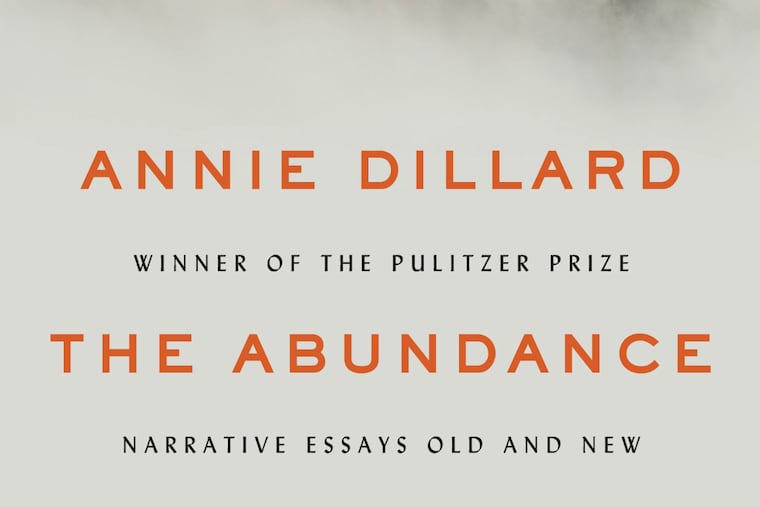Annie Dillard's 'Abundance': Time is pounding
Annie Dillard is not a quick read. Her writing jumps and twists and streams, and it's up to you to filter her words slowly and find meaning.

The Abundance
By Annie Dillard
Ecco. 304 pp. $25.99 nolead ends
nolead begins
Reviewed by
Dawn Fallik
nolead ends Annie Dillard is not a quick read. Her writing jumps and twists and streams, and it's up to you to filter her words slowly and find meaning.
Annie Dillard is not a simple read. It seems that way at first. She will spell things out for you, but then you've got to assemble the parts.
And in her new collection of old essays, The Abundance, Annie Dillard is not for the surface fish. She constantly challenges the reader to dive deeply, maybe more than we wanted.
Can you breathe here? she asks in "Waking Up Wild." It is time pounding at you, time. "Who is your everyone?" she demands in "This Is the Life."
My everyone is so small, the reader suddenly thinks. I wish it were larger. When did my everyone shrink so? It's a perfect book for snow and gray skies and deep thoughts.
The essays come from myriad stops in Dillard's life: An American Childhood, Pilgrim at Tinker Creek (for which she won a Pulitzer Prize), and The Writing Life, among others.
On her website, the first words Dillard writes are "I'm sorry." She apologizes for not promoting her books, for not being able to travel anymore (She doesn't say why.) She hates Wikipedia for its errors. Don't expect her to do much promotion for The Abundance.
She takes us along driving in Yakima through an eclipse, clutching pennies in Pittsburgh, and staring at prehuman footprints in Tanzania. Through time and life and death and the wonder of a big birthday party.
Dillard works well being read out loud. It's like music, and the melody appears in little bursts. The reader hears the song as a whole as almost only an echo.
"And today was fair, hot even; I woke and my fingers were hot and dry to their own touch, like the skin of a stranger," she writes in "The Waters of Separation."
"I stood at the window, the bay window on which in summer a waxy-looking grasshopper has breathed puff puff, and thought, I won't see this year again, not again so innocent, and the longing wrapped around my throat like a scarf."
Time is pounding, says Dillard, again and again. Look around, be amazed, and pay attention.
Dawn Fallik is a former Inquirer staff writer and an assistant professor of journalism at the University of Delaware.